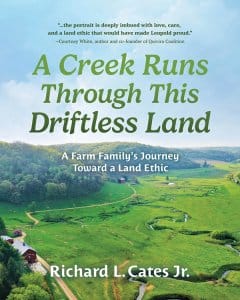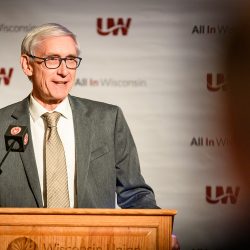On Loving the Land
Richard Cates PhD’83 recounts his family’s journey from owning to knowing their farmstead in A Creek Runs through This Driftless Land.

The Cates Family Farm is an example of how people and places can thrive together.
What started with good earth and elbow grease has grown into a lifelong lesson in gratitude for Richard Cates PhD’83. In A Creek Runs through This Driftless Land: A Farm Family’s Journey toward a Land Ethic, Cates tells the story of the place that has cared for his family for generations and their commitment to returning the favor.
Cates’s father purchased the farm in Spring Green, Wisconsin, in 1967, and Cates and his siblings grew up working the land and making bucolic memories in their Driftless-region valley. After leaving Wisconsin for his bachelor’s and master’s degrees, Cates and his wife, Kim MS’83, landed at the UW, where he completed his doctorate in soil sciences before returning to the soil that raised him.
In A Creek Runs through This Driftless Land, Cates reflects on the 30-year process of transforming his family farm from a “110-acre thistle patch to a beautiful perennial grassland.” He recounts the history that predates his family’s residency, from the Indigenous peoples who first called the valley home to the European settlers who displaced them, before delving into the Cates family’s commitment to conservation and the philosophies that guide their stewardship.
As a result of their efforts, the Cates Family Farm is decorated with eco-friendly accolades. In 2006, they were the first beef farm in the country to receive certification from the Animal Welfare Institute. In 2013, they received the Leopold Conservation Award from the Sand County Foundation and Wisconsin Farm Bureau Federation. They are founding members of two local watershed protection groups, and in 2020, Lowery Creek, which flows for three-and-a-half miles through the Cates farmland, was elevated to a Class 1 trout stream.
“There could not be a more important time to revisit the process of restoring ourselves and each other by learning to understand, care for, and restore land,” wrote Jed Meunier MS’05, an ecologist and great-grandson of conservationist Aldo Leopold. “This book gives us a beautiful example of this process and reminds us that a land ethic is not simply a concept or philosophy, but a process of humanity, care, and hope.”
Published in the Summer 2025 issue



Comments
No comments posted yet.